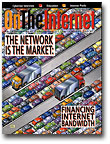e-OTI/OnTheInternet Archives
All articles from e-OTI are available from the archives. Selected articles from previously-issued
printed editions are also available. Complete printed back issues
are available from the ISOC Store.
|
|
|
July/August 1999
Riding the Tidal Wave
By Toni Alatalo
What do you call a programmer and Internet entrepreneur who learned
to use a telephone as a teenager - five years after learning to
use a computer - and who calls his cell phone "the other important
communication channel besides the Internet itself? We call it
today's youth. Read the story of Toni Alatalo and find out how
his techno-savvy generation is growing up on the Internet.
The Internet and the Family: The View from the Press
By Joseph Turow, John Bracken, and Lilach Nir
According to a recent study by the Annenberg Public Policy Center,
two-thirds of 1998 newspaper stories about the Internet focused
overwhelmingly on the new technology's most negative aspects,
leaving most parents and educators with an unwarranted sense of
fear of the Net.
Aggregate, Syndicate, Dominate: How InfoSpace.com Mapped a Course
to Success
By Madanmohan Rao
Contributing editor Madanmohan Rao uncovers the secrets behind
the three-year meteoric rise of a former Microsoft employee to
CEO of the industry's top content aggregation and redistribution
company.
|
|
|
|
|
May/June 1999
Why Spam is a Problem
By Ray Everett-Church
If junk mail is accepted as a fact of life, why is unsolicited
e-mail - otherwise known as spam - such a problem? The author
takes an in-depth look at the hidden costs of spam, who's doing
it, and why the problems caused by spam will fundamentally shape
the way individuals and businesses use the Internet.
The Internet in Argentina: Study and Analysis of Government Policy
By Thierry Chaumeil
The Internet is poised to become an important influence on Argentina's
culture, commerce, and government. And as with any fundamental
shift in infrastructure, there are obstacles. One is linked to
Argentina's emerging economy. Another is a telecom legal framework.
Find out how Argentina is overcoming both in its determination
to make the Net an Argentinian reality.
|
|
|
|
|
March/April 1999
The Internet, Satellites, and Human Rights
By Michiel Hegener
If developments in satellite technology can deliver fast, inexpensive,
and reliable telecommunications to the public, should some governments
fear them? Compelling evidence suggests that human rights are
violated most often in areas with poor telecommunications infrastructures.
Dictatorial regimes survive most often in countries with fewer
than 20 telephone lines per 100 inhabitants. The complex relationship
between the Internet and human rights is explored and assessed
by Michel Hegener in one of his most thought-provoking articles
to date.
Complexity and the Networked Society
By Alan McCluskey
The author reports on the future of our networked society as described
by Nobel peace prize-winning author Ilya Prigogine at IST's most
recent conference in Vienna.
Virtual Networks Are Now as Important as Railway Networks - An
Interview with Tara Vishwanath
By Madanmohan Rao
OnTheInternet contributing editor, Madanmohan Rao, interviewed World Bank consultant
Tara Vishwanath on her most recent project, the 250-page Knowledge
for Development, its reception in dozens of countries around the
globe, and it's recommendations to developing countries.
|
|
 |
|
January/February 1999
The Network Is the Market: Financing Internet Bandwidth
By John du Pre Gauntt
Although the public relishes the idea of unimpeded access to an
endless flow of free information, the reality of the current bandwidth
market shows startling price differentials and areas where service
simply does not exist.
The Internet Potential for an Education of Hope
By Edwin H. Gragert, Director, I*EARN-USA
All to often, educators focus on the Internet’s storage capabilities
and its value as a research tool. But the technology offers instructors
and learners more than just access to the world’s biggest library.
The author offers ways to take advantage of the Net’s human connective
potential to empower students and improve education.
Internet Governance: The Struggle over the Political Economy of
Cyberspace
By Madanmohan Rao
As the global Internet user population heads closer to the 15-million
mark, an alphabet soup of organizations are being drawn into the
struggle to define and shape the protocols, architecture, content,
and transactional regulations of the Internet.
ISOC in Internet Governance
By Don Heath
The president of the Internet Society offers an overview of the
major strides the Internet has taken in the past few years--and
outlines some of the steps we can anticipate next.
I Think ICANN
By Wendy Rickard
There’s no doubt 1998 was an interesting year for the Internet.
But with the U.S. government finalizing its attempt to get out
of the domain name management business, it also was the year that
Internet self-governance began.
The Perils of the Internet
By Lloyd Conklin
By barring strong encryption for electronic transmissions and
implementing encryption-key escrow accounts, governments are asking
law-abiding citizens to suffer the consequences of rules meant
to be impediments to those who disdain them or who simply go around
them.
Bringing the Net to the Masses: Cybercafés in Latin America
By Madanmohan Rao
In emerging economies, such as those in Latin America, numerous
projects have been launched incorporating public Internet kiosks,
cybercafés, community access centers, and multimedia communication
booths.
|
|

